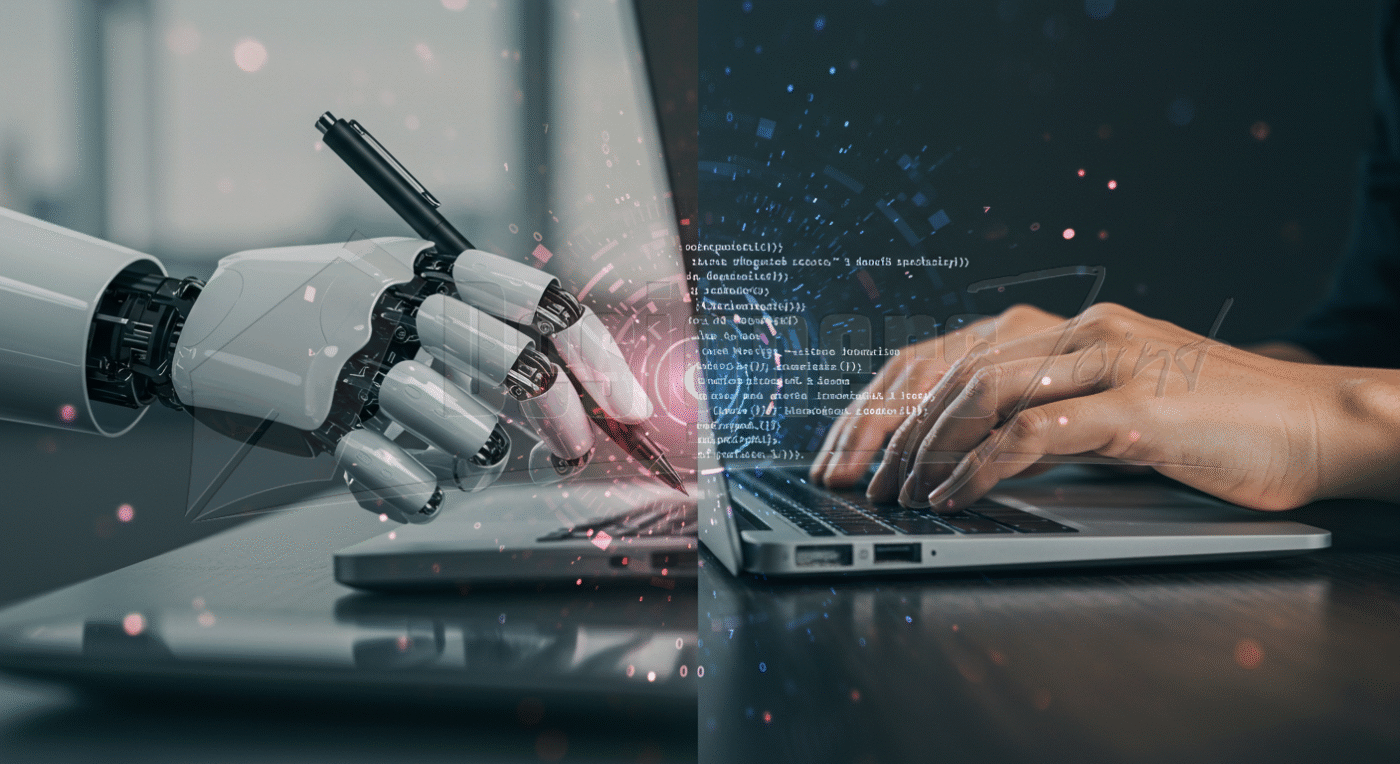Design Trends, Design Guide, Tech Guide
The Future of Coding: Will AI Replace Web Developers or Empower Them?
A Question Every Developer Is Asking
Will AI Replace Web Developers: Back when I wrote my first line of HTML over a decade ago, coding felt like pure craftsmanship—line by line, tag by tag. Fast forward to today, and Artificial Intelligence (AI) can already generate entire layouts, fix bugs, and even explain code in plain English. Naturally, the question on every developer’s mind is: The future of coding—will AI replace web developers or empower them?
In this article, I’ll draw from my 10 years in the industry, share real experiences, and break down where coding is heading. By the end, you’ll see why the answer isn’t as black and white as “yes” or “no”—and what you can do right now to prepare for what’s coming.
1. AI Is Already Writing Code, But It’s Not Independent
Tools like GitHub Copilot, Tabnine, and Codeium have shown that AI can write functional code quickly. I’ve personally used Copilot to generate React components, and while it saves time, it often produces something that still needs refining.
Here’s the reality: AI doesn’t fully understand project goals, user needs, or business logic. It generates patterns from existing code, which means you, the developer, still need to guide and correct it.
So in the near future, AI won’t replace web developers—it will act as an assistant, like a junior developer who learns from you.
2. Developers Will Shift From Coders to Problem-Solvers
When repetitive tasks and boilerplate code are handled by AI, developers will spend more time focusing on:
- Designing system architecture
- Creating user-friendly experiences
- Understanding business requirements
- Innovating with new technologies
Personal Insight: On a SaaS project I led, I used AI to handle unit test generation. That gave me time to work directly with the client on improving their onboarding flow. AI handled the repetitive part, but the client-facing strategy? That was on me.
The future of coding shows that web developers won’t be replaced—they’ll be empowered to spend more time on high-value work.
3. AI in Debugging and Security Will Empower Developers
Debugging is one of the most frustrating aspects of development. AI tools like DeepCode and Snyk already analyze vulnerabilities in real-time and suggest fixes.
Example: While building a fintech platform, Snyk flagged an insecure database query that I had overlooked. It didn’t just warn me—it recommended a safer query. That kind of empowerment makes me a more effective developer, not a redundant one.
By 2026 and beyond, AI will likely become the 24/7 watchdog for web applications, empowering developers to build safer products without spending hours chasing bugs.
4. Will AI Replace Entry-Level Developers?
This is the fear many new developers face. Entry-level jobs often involve repetitive coding tasks, documentation, and simple bug fixes—all things AI can automate.
But here’s the truth: those tasks were never the end goal of a development career. The best developers grow into problem-solvers, architects, and team leaders.
For beginners, the key is to learn how to use AI effectively instead of avoiding it. The future of coding will reward developers who can collaborate with AI tools, not compete against them.
5. Human Creativity and Context Can’t Be Replaced
Coding isn’t just syntax—it’s about solving human problems. AI can generate code, but it doesn’t understand why a website needs to load faster for a particular audience or why a business needs a custom checkout flow.
Example from My Work: I once had a client in the travel industry who needed a booking system that adapted to different regional preferences. AI couldn’t predict those cultural nuances. That’s where human creativity and empathy came in.
This shows that AI may automate the how of coding, but the why will always belong to developers.
6. Continuous Learning Will Decide Who Thrives
The developers who thrive in the AI era will be those who embrace learning. Just as we once adapted from jQuery to modern frameworks like React and Vue, we’ll need to adapt to AI-assisted workflows.
Practical advice:
- Learn how to guide AI coding assistants effectively
- Stay updated on AI-powered testing and deployment tools
- Strengthen problem-solving, communication, and creative thinking skills
The future of coding won’t be about who can memorize syntax—it will be about who can use AI tools strategically.
7. The Future of Coding: Collaboration, Not Replacement
So, will AI replace web developers or empower them? From my perspective, it’s both and neither. AI will replace parts of our work—repetitive, low-level coding tasks—but it will empower us to be more creative, strategic, and impactful.
Think of AI as a teammate who handles the grunt work while you focus on innovation. That’s the real future of coding: collaboration between humans and machines.
Conclusion: Developers Still Hold the Future
To sum it up: the future of coding isn’t about losing jobs—it’s about redefining them. AI will take over repetitive work, but web developers will still lead in problem-solving, creativity, and strategy.
Instead of fearing replacement, we should see this as an opportunity to become more effective than ever. And if you’re looking for resources, templates, and tools to keep your skills sharp in this AI-powered era, visit DesignersJoint.com—a trusted hub for developers and designers who want to stay ahead.
FAQs
1. Will AI replace web developers completely?
No. AI will automate repetitive coding tasks, but developers are still needed for creativity, problem-solving, and understanding business goals.
2. What skills should developers focus on for the future of coding?
Focus on architecture, system design, creativity, problem-solving, and learning how to use AI tools effectively.
3. Can AI build websites on its own?
Yes, but only simple websites. Complex, user-focused, and scalable applications still require human developers to guide the process.
4. How can new developers stay relevant as AI advances?
Embrace AI tools, practice critical thinking, and develop soft skills like communication and collaboration alongside coding knowledge.

